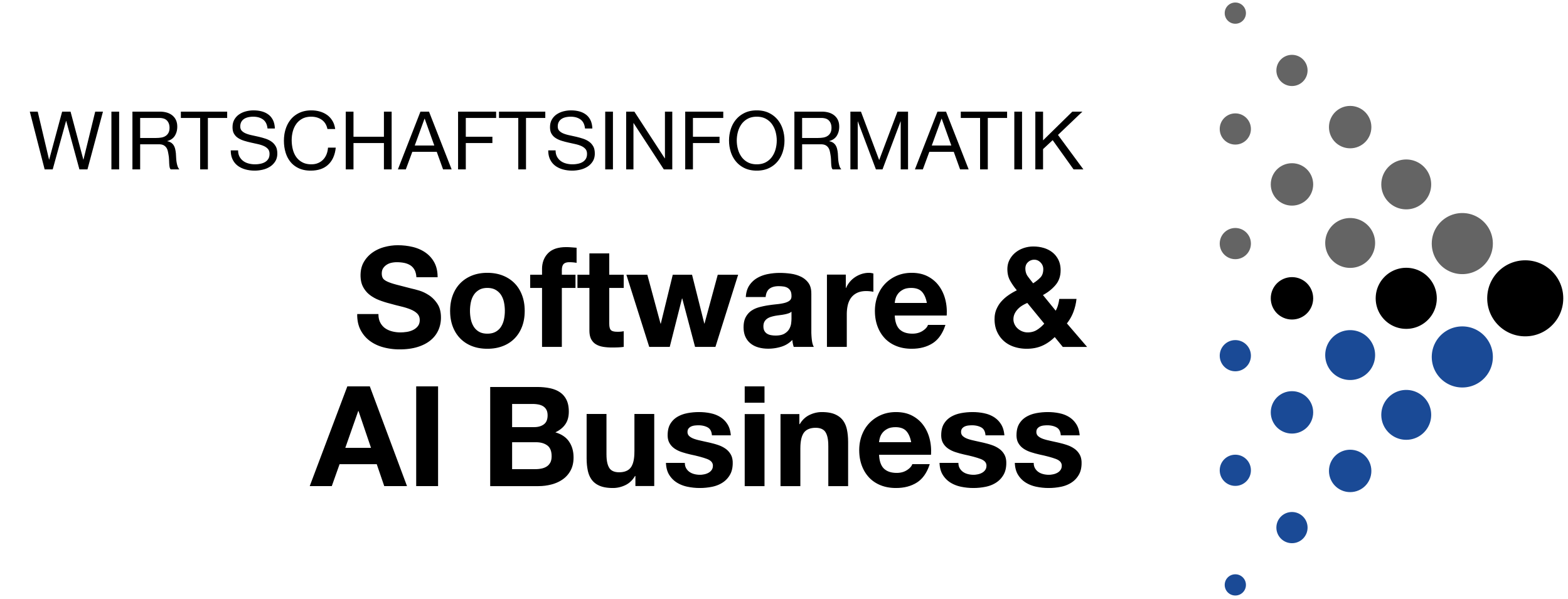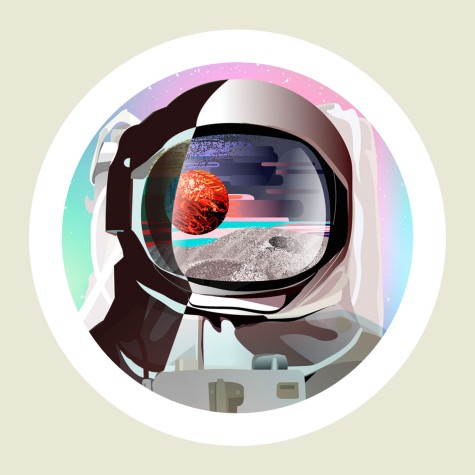Prof. Dr. Peter Buxmann

Graduates report
Here you can find exciting insights concerning the topic of final theses. True to the motto »from students for students«
Our former students share their experiences and insights gained during their final thesis at the Software & Digital Business Group. If you are interested in writing a thesis with us, you are welcome to apply here:

To the Experience Reports
From the Library to the Beach: Our unexpected Trip to Hawaii
If someone had told us at the beginning of our seminar that we would be able to present our work at the 56th Hawaii International Conference on Systems Science less than a year later, we most likely would have shaken our heads in disbelief. How this came about, however, is something we would like to explain to you in more detail.
In our work, we investigated how artificial intelligence can contribute to more sustainability in the field of agricultural economics. During our research period it was especially valuable that we could go to our supervisor with all our questions and that we could clarify them in weekly to bi-weekly meetings (e.g. how to conduct a structured literature review in the field of information systems). This also allowed us to clarify any new questions that arose and be sure we were on the right track and within schedule. With the results of our research, we developed a so-called Concept Matrix, which allowed us to clearly structure the relevant articles on the topic. By following a systematic approach, we were able to gain interesting insights and identify research gaps. For us, it was already a success to be able to delve so deeply into the scientific work and thus contribute to the discussion around the topic of sustainability.
However, the most exciting part of our work actually happened after the actual seminar: We had the opportunity to further elaborate our work and submit it to a scientific international conference afterwards. And indeed, our work was accepted at the 56th Hawaii International Conference on System Sciences. This gave us the opportunity to go to Hawaii and present our work to researchers from all around the world. That was pretty exciting! On site, we were able to expand our knowledge through many interesting talks, making new contacts and, of course, having the experience of presenting our work at an international conference. On top of that, we had plenty of time to explore the island and its beautiful nature.
All in all, it was a very exciting and interesting time in which we were able to gain many new insights into the world of scientific work. Therefore, we can only encourage students to approach scientific work with commitment and fun – it's worth it! Maybe you will be the very next to present your seminar paper or thesis at a conference!
Jonas Witte & Kevin Gao
Artificial Intelligence and Sustainability
Arguably the only issues currently being discussed as extensively as the recent outstanding achievements of Artificial Intelligence (AI) are the equally major ethical considerations. Although many of these issues have been known for a long time, they are rarely implemented in practice. But how can companies that conscientiously apply this powerful technology to a wide range of business processes be distinguished from those that have little regard for the environment and society? This is the topic I deal with as part of my master's thesis, which I applied for proactively. Working out my own topic not only allows me to address my own areas of interest, but also offers me many creative opportunities at the same time.
The idea of combining the topics of AI and ESG, i.e. non-financial reporting by companies in the areas of Environmental, Social & Governance, had been on my mind for a while. Besides my general interest in Artificial Intelligence, I was particularly attracted to a responsible use of it. I was interested in how I could use the knowledge I gained from my studies not only technologically, but also to stand up for my beliefs. Subsequently, I looked more intensely into the topic of ethical use of Artificial Intelligence, whereupon I sent a proposal to the department after doing further research. Shortly after, I received a response from my supervisor, who was eager to discuss the topic with me. We both found the topic exciting and were able to concretize and delimit it together.
The support from the chair helped me in my first steps to find a suitable research method for my thesis – Design Science Research. This qualitative method tries to extend existing knowledge in certain research areas by creating so-called artifacts. Since I combine the fields of AI and ESG, my concrete artifact is a framework that shall allow companies and external auditors to evaluate concrete AI Use Cases in the company from an ethical point of view, and to report the results analogous to ESG scores.
The interaction of AI and ESG is just emerging in the literature, so I have to build up many thoughts and argumentations myself. Here, the regular exchange with my supervisor is very valuable – not only does it give me the opportunity to get valuable feedback; I especially gain a sparring partner to whom I can regularly present my ideas. This helps me to formulate my thoughts clearly and precisely and to critically question them myself. After a few weeks of work, strands of argumentation are sometimes so intertwined that it helps enormously to reopen them. Where can you save on arguments, where should you tighten up? In the end, I of course bear the full responsibility for the design and the decision-making process.
All in all, I work independently, in my own field of interest and with conscientious support, on a highly relevant topic. What more could you ask for? At the moment, I am about halfway through my thesis. Thus, I am far from being finished, but a few key learnings so far are:
- The scope does not have to be precisely defined right from the beginning. The topic evolves in the course of research and processing time, and that's just fine.
- Small, self-imposed or agreed upon deadlines are important to stay in the rhythm. 6 months seems long, but it's not an eternity!
- In my case, I not only create the master thesis itself, but also build the artifact. As mentioned above, it has proven useful for me to take a step back every now and then, and rehash the last work results (not necessarily in writing, but also graphically). Am I getting the complex thought processes articulated in a clear way? Are there gaps somewhere?
If you have any questions about my work or the process in general, please feel free to contact me, via LinkedIn. Good luck with your theses!
Philipp Farnschläder
Design of AI-Based Business Models for Deutsche Bahn
The goal of my thesis was to develop a design process for an AI-based business model. In addition, Deutsche Bahn Vertrieb GmbH supported me as an external practical partner. Practical insight – great! Not a minute later, the mail left my inbox in which I applied for the topic. Shortly thereafter, I received a message that the topic was still available.
Maybe you're feeling the same way I did when I was looking for a topic for my thesis. Perhaps you are still undecided about the direction you want to take? With this report I would like to give you some orientation. You will get an insight into why I chose the department of Prof. Buxmann and why this was my best decision.
I wrote my bachelor thesis at the department of control engineering. I wanted to find a counterbalance to this and therefore write my master thesis at an economics department. “Something about disruptive technologies, digital business models, IT or AI … ”, I thought to myself. I visited the websites of various departments at FB 01. I finally found what I was looking for at the Software & Digital Business Group: the advertised exposés covered exactly the topics I was looking for. One call for proposals particularly caught my eye and I immediately fell in love with it. It formulated the need for a design process for an AI-based business model. In addition, Deutsche Bahn Vertrieb GmbH was present as an external partner, which made the posting that much more interesting to me. Practical insight – great! Not a minute later, the mail left my inbox in which I applied for the topic. Shortly thereafter, I received a message that the topic was still available.
During the kickoff, I got to know the contact persons at Deutsche Bahn better. During this meeting, we decided on contract management as a suitable use case. An AI service was to be developed for this use case. In the first few weeks, I combed through numerous scientific publications and highlighted the current state of development on AI services. At the same time, I researched how business models are generally developed in companies. One tip I'd like to share right away: a thorough examination of the literature helps to narrow down the methodology that will be used later on at an early stage. Therefore, I recommend to start with the literature review as soon as possible and to deal intensively with a lot of papers.
In the weeks that followed, I developed a draft for a business model, which I then validated in expert interviews and adapted to the Deutsche Bahn. The challenge was to get employees from various departments at DB on board. I noticed in the first interviews that the business model was still very abstract formulated for some DB employees. I therefore created an individual presentation for each subsequent interview. This allowed me to visualize and explain my ideas more comprehensibly. The key result of my master thesis consisted of a design process for AI-based business models. Within the expert interviews, I was able to identify five escalation stages within change management.
Julian Hüsselmann
Digital Transformation in the Age of Artificial Intelligence – An Analysis Based on DAX Companies
The digital transformation is impacting companies across all industries, sizes and national borders. The widespread availability of modern, digital technologies – currently artificial intelligence in particular – is creating the need for far-reaching changes in order to maintain a company's own competitiveness. In order for companies to successfully manage this major shift, a separate Digital Transformation strategy is required.
In my master thesis, I investigated the different strategies that companies can implement in order to successfully manage the digital transformation. For this purpose, I developed a framework to classify strategies regarding digital transformation on the basis of a systematic literature review. Subsequently, I analyzed the annual reports of DAX30 companies. In doing so, I particularly paid attention to which strategies the companies implement to manage the Digital Transformation. I evaluated the extracted strategies for managing the Digital Transformation using the previously created framework. This resulted in several recommended actions that companies can incorporate when designing their Digital Transformation Strategies in the age of Artificial Intelligence.
Niklas Jutzler









